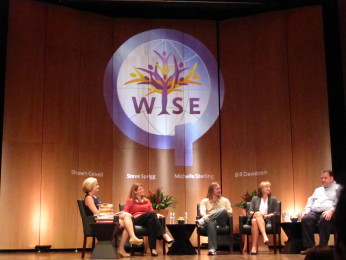Women have long encountered difficulties in the workplace, most notably in fields geared towards science, where the environment is predominately male. While the days where women were only able to fulfill the role of homemakers and housewives are far behind us, women still constitute a minority in careers like engineering, biotechnology, and medicine. The fact that high school students are actively seeking social acceptance at this age, girls often more so than boys, might explain the current lack of female presence in the science field.
Here in America, students often belittle those who pursue an interest in science and math, branding them as “nerds” who are incapable of doing anything “fun.” Young women in particular fall easily into the common perception that those with a strong interest in science are societies’ awkward social rejects. To avoid falling under this category, many high school girls simply distance themselves from developing a real interest in science. As a result, students in the USA are highly business oriented. Whether women can garner a greater presence in fields like engineering depends upon how much subjects like math and science are emphasized early on during their childhood. Smart people can learn anything, but it is willingness that is the key.
There are, however, organizations such as Qualcomm Women in Science (QWISE), which are dedicated to resolving this issue. The group, which promotes the personal and professional growth of women in science and engineering at Qualcomm, celebrated their fifth anniversary at Qualcomm on Oct.17.
During the event, women from all throughout the company were able to talk with Qualcomm executives in a roundtable discussion. Senior Vice President Susie Armstrong was one of the four executives present. Interestingly enough, Armstrong, prior to her employment at Qualcomm, received a call directly from Steve Jobs to join his company NEXT, before his other business endeavor, Apple, had captivated the world.
Armstrong, however, who studied computer processing and system engineering at Cal Poly St Louis Obispo, chose another company to work with, and has been with Qualcomm since its early beginnings. Nowadays, Qualcomm dominates the cell phone technology business, its chips (integrated circuits) present in Androids and IPhones alike.
As Armstrong led the group discussion, an intriguing question arose. Although Qualcomm is an American company, founded by Irwin Jacobs and now led by his son and CEO Paul Jacobs, it employs a substantial number of Southeast Asians as engineers. So why is it that compared to America, Southeast Asia can produce a greater number of engineers, women especially? The reason stems primarily from the differences in culture between the United States and places like India.
In India, a career in science or engineering is prestigious, honorable, and highly sought after. So while women there aspire to become either doctors or engineers, America has yet to place such an importance on careers in science. It is a shame though, that the lack of American interest has created an imbalance between men and women in the science field. For as Senior Vice President of Engineering Steve Sprigg put it during a panel discussion later on in the evening, “The advantage women have against men in this industry is a great one. Women always try to understand the other person’s issues,” said Sprigg. “They have this ability to listen to input and then deal with it and come back with a reasoned opinion. Men, unfortunately, are the opposite. We suffer from what I like to call SPIRD disorder or, Smartest Person in the Room disorder.”
The science and technology industries are becoming increasingly important as the world has come into the 21st century, and women should be using whatever innovation and talents they have been granted just as much as men are.
But to both women and men seeking a career in science, Sprigg had one final piece of advice: “Don’t ever be afraid to say you don’t know something. Opportunities are open not by saying you’re an expert, but by expressing interest.” It matters not how little or how much knowledge one possesses, for as long as there is an interest and a desire to create and comprehend, anything is possible.

